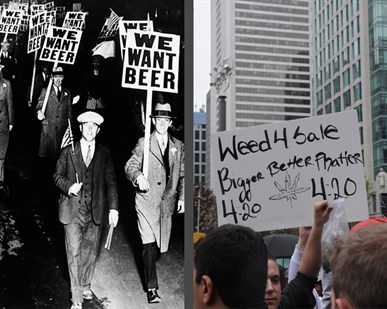
Image Credit: Compilation/Jennifer Stahn
June 24, 2013 - 8:59 AM
WHERE WE'RE GOING
This is the first of a five-part series on changes in the marijuana industry. We begin with the new marching orders from Health Canada. The same government body that made marijuana growers legitimate will once again make them criminals. Today, a brief look at how we got here and where we're going. Tomorrow, we look at family physicians and how Health Canada put them in the uncomfortable position of gatekeeper.
Canada is changing the way it does medical marijuana.
By April 1, 2014 new regulations will go into effect prohibiting medical marijuana patients and their designated growers from cultivating the medicine. Instead, private companies have new regulations calling for high-tech marijuana factories that will alone handle the supply. Patients will no longer require a license from Health Canada, but instead get prescriptions from their doctors, like one would for other medical drugs.
It's yet another major change to the way Health Canada is making the drug available, ostensibly for medical purposes after licencing individuals to grow their own or allow virtually anyone who applies for a licence to grow for people with Health Canada medical marijuana licences.
Why the drastic overhaul?
Health Canada says the current system is prone to abuse, with designated growers cultivating far more than their license allows and diverting product to the black market.
Stephane Shank, spokesperson for Health Canada, says transitioning to large-scale commercial grow operations will allow authorities to better inspect what goes on behind closed doors, and make sure the product only goes to those who really need it.
“We have to keep marijuana off the black market while also making sure people can get what they need,” Shank says. “Right now, you can’t track where any of that marijuana goes.”
He says the new marijuana factories will have to meet strict requirements to get licensed. Small-scale ‘ma and pa’ grow-ops will likely not have the capital to invest in the strict upgrades demanded by Health Canada. If they continue to grow, they will once again be outlaws.
“There will be higher security and higher standards of safety and tracking of transactions,” Shank says.
Under the new rules, growers will have to provide a written notification of their application, providing details regarding the location of the production site to local police, fire and government. This would serve to ease some of the tensions between RCMP and marijuana growers, Health Canada says.
Marijuana would be distributed to clients with a prescription from a doctor or nurse practitioner via secure courier only.
“People won’t have to drive for hours because the nearest provider is far away," Shank says. "It will be mailed to them in one to two days."
There’s a chance the price per gram will increase, but Shank won’t speculate on that. He also won’t speculate on the possibility that patients might choose to buy from the black market because it’s cheaper.
“Those who would seek black market marijuana because it's cheaper would unfortunately be subject to law enforcement,” he says.
WHO WILL MONITOR MAIL-ORDER MARIJUANA?
Marijuana advocate Dana Larsen has been lobbying for changes in the system for years, but not the ones Health Canada has decided to implement.
“It’s taking away from the patients who invested time and money setting up their own grows and learning how to produce for themselves,” Larsen says, adding designated growers who made substantial investments into their installations will also be out of luck.
He anticipates problems with the mail delivery system, noting how packages mailed from his illegal, yet tolerated Vancouver dispensary, often go missing.
“There’s going to be a lot of pot going through the mail and some of it will go missing,” he says. “Then you’ve got a patient with their medicine stolen.”
There’s been rumour that pharmacies will eventually carry marijuana, but Larsen sees issues with that too.
“A lot of doctors and pharmacists don’t want anything to do with marijuana,” Larsen says. “London Drugs isn’t going to carry herb—maybe tinctures and capsules—but not the raw product.”
He believes dispensaries could take over the distribution, but “we haven’t been considered in the plan at all.”
“I’m not against larger companies starting up, but taking away the right for a patient to grow their own is wrong,” he says.
He agrees the present system isn’t perfect when it comes to crime, but he says the new regulations will simply create more illegal growers. He supports licensed grows of any size, as long as they’re inspected from time to time by authorities.
“Health Canada gave out all these licenses for grow-ops, but they never inspected them,” he says.
Larsen sees legalization as the only way to properly handle marijuana—medical or recreational.
Some industry players we’ll hear from in this series will say Health Canada’s privatization of marijuana is an indicator that Canada is moving towards decriminalization and legalization, as some American states have started to do.
“But this?” Larsen says. “This is a step in the opposite direction.”
To contact the reporter for this story, email Charlotte Helston at chelston@infotelnews.ca or call (250)309-5230. Follow on Twitter @charhelston
News from © iNFOnews, 2013